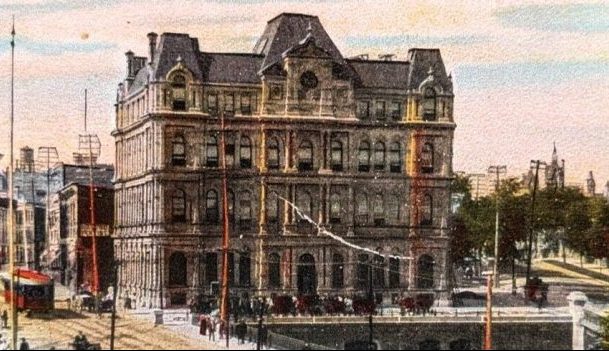Sir Wilfrid Laurier, the great seeker of the “sunny ways” in politics, lived in a grand hotel just steps from Parliament Hill before he became prime minister. The Russell Hotel was Ottawa’s answer to 19th century elegance. In time it descended into ruin.
Laurier arrived in Ottawa in 1874. The capital then was a place of sharp contrasts with shining new parliament buildings surrounded by dismal muddy streets, ramshackle houses and open sewers.
“Ottawa is not a handsome city,” said Laurier. “I would not wish to say anything disparaging of the capital but it is hard to say anything good of it.” Later as prime minister he created the 1899 Ottawa Improvement Commission devoted to beautification of the city.
Laurier lodged at the Russell Hotel, a glittering example of Second Empire architecture designed by Henry Hodge Horsey, a prolific architect. The building filled the south side of Sparks Street, east of Elgin, catching the eye of passersby with a mansard roof and corner tower, numerous hooded windows and elaborate ornamentation.
The Russell boasted “250 rooms elegantly furnished,” reported Canadian Illustrated News, with English carpets and an Ottawa novelty: two passenger elevators that sped visitors up four storeys.
Laurier hated the hotel. He complained it was too costly and smelled of food and drink from its famed tavern that had been a caucus hangout since the days of Confederation.
Yet Laurier remained at the Russell House for 24 years. Here he wrote the ringing speeches that transfixed the House. Here he launched his 1896 election campaign that restored Liberals to power for the first time in a generation.
In time Liberal contributors bought Laurier a mansion in Ottawa’s Sandy Hill on Theodore Street, now Laurier Avenue, where the party chief remained till his death in 1919. Laurier House was subsequently willed to his successor Mackenzie King and in 1950 turned into a National Historic Site.
And the Russell? It remained Ottawa’s premier hotel until the Chateau Laurier opened nearby in 1912, then went into a long, sad decline. It closed its doors in 1925.
When Mackenzie King proposed to turn Elgin Street into a grand boulevard south from the National War Memorial, the dilapidated hotel was in the way.
While talk of expropriation was ongoing the vacant building suffered a major fire on April 14, 1928, and what remained was demolished. There is now nothing to remind us of Ottawa’s grand hotel or Laurier’s life in it.
By Andrew Elliott









